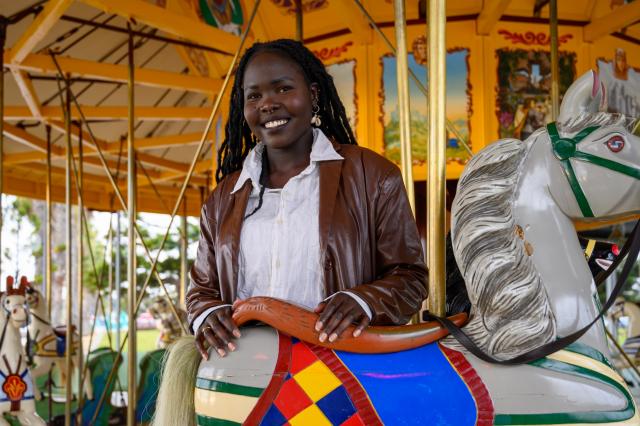To read Hopeless Kingdom by Kgshak Akec is to wade through a multitude of tiny heartaches and world-changing explosions, of a family lost before they are found, of migration and trauma, of mothers and daughters.
From their lives high above the ground in a Cairo apartment, we learn Akita and her family have already travelled and settled from Sudan. Through the changing perspectives of the eight-year-old and her mother Teresai, a complex tapestry of their lives comes together.
Akita’s big brother Santo is boisterous, untameable, and she can’t help but want to be near the thrill of his danger. Jumping through windows at precarious height, or running off to the night markets of an ancient city, Santo is risk itself.
When their father, Santino, comes home with the news of a safe passage to Sydney, place, and its vast unknowns, is established as a driving force of this novel. Everything the family has ever known – from the colour of the ground to the heat of the day – is left behind.
The humidity, seasons, colours and easy friendships of Sydney envelop Akita, and she falls in love with her new home.
It isn’t so easy for Santo. After another incident at school in a long line of violent outbursts, he is diagnosed with attention-deficit/hyperactivity disorder and disruptive mood dysregulation disorder.
The collection of acronyms which come to define Santo make Teresai nervous. His behaviours begin to make more sense, but society and the forces of racism make him more vulnerable to being misunderstood. ‘How fortunate are we, to live in a place like this, a country where they have medicines for illnesses and diseases that the eyes cannot see?’
These moments in the novel are reminders of the journey they have already made and the journeys they are still making, each forging their own path in a relatively hostile Australia.
The move from Egypt is hardest for Teresai, who has five languages but none of them English. Without it, Australian life seems impenetrable. Then, when Santino decides he must leave his pencil-pushing life in Australia to pursue one he never could, Teresai’s fury is palpable. Fury, which is beautiful in its nuance and makes it difficult to believe debut novelist Akec is just 24 years old – there’s something distinctly knowing about Teresai’s hopeless, helpless anger.
The family settles in Geelong to be nearer to Teresai’s family when Santino leaves. It is hard. The family they find, Teresai’s mother and sisters, still symbolise her scars of years of hurt and trauma. Teresai’s character deepens with every interaction.
Akita’s sad wordlessness upon leaving Sydney demonstrates that language can only get anyone so far – because a child’s silence will always speak louder than their words. The innocence of their grief is more heartbreaking.
A new school and a new Corio home – regional Australia is a much more alien place than bustling Sydney.
‘Mr O’Malley takes a breath and says he’s thrilled to have us attend this school; we’re the first African students St Paul’s Primary has ever had. He grins at us like it’s supposed to make us cheerful, but all I want is to disappear into thin air.’
Santino finally leaves, and the kids are broken. Teresai is alone and finds her way, essentially raising the family as a single mother. Akita steps up, parenting while she’s still a child. Santo spirals, his own path littered with landmines in his own neurodivergent mind – the rigidity of life can’t contain him and he explodes into a thousand pieces. Akita’s changing relationship with Santo is emotional. It is devastating, written with great, gentle compassion.
Everyday racism in Australia plays out in ways both obvious and covert. From Akita’s discomfort as a child at a white friend’s sleepover to the presence of her white high school boyfriend guaranteeing a path out of trouble for her sister – the things white Australia takes for granted are used as delicate reminders of privilege.
Throughout, Teresai’s strength is an ode to mothers, full of insight and power.
Winner of the 2021 Dorothy Hewett Award for an Unpublished Manuscript, Hopeless Kingdom is a conjuring, knowing exploration of race, migration, gender and belonging. It is generous. This novel is not just read, but fallen into – to re-emerge is to live with greater knowledge of migrant experiences held inside this country.









